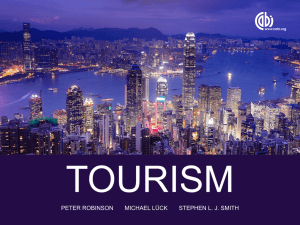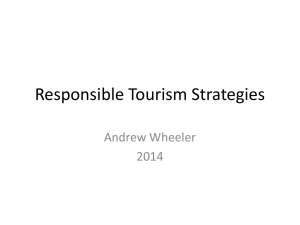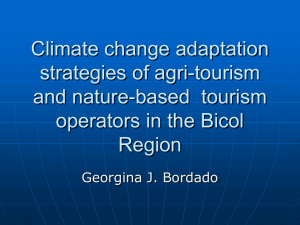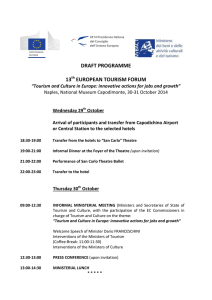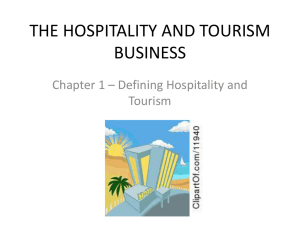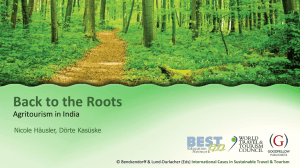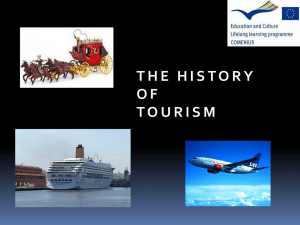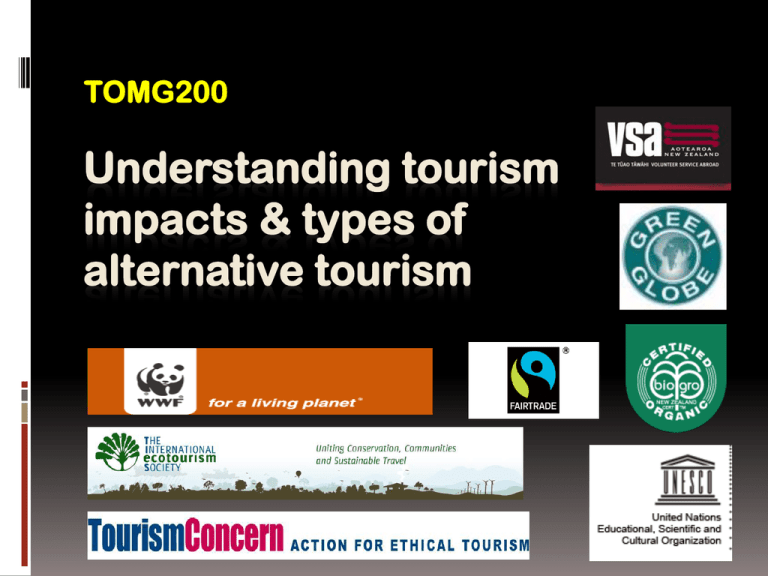
TOMG200
Understanding tourism
impacts & types of
alternative tourism
Aims of today’s lecture:
To illustrate some examples of the potential
impacts of tourism on different environments
To critically review ‘alternative tourism(s)’ as
a quest for ‘sustainable tourism’
Some examples of the impacts of
tourism on different environments:
Video: Impacts of Tourism [G155.A1I45 2001]
Cultural Impacts –
preservation,
appreciation,
cultural exchange,
local skills,
authenticity.
Physical Impacts - Urban
- Rural
- Built
- Natural
Tourism
Social Impacts – social
changes, quality of life,
‘spirit of place’,
displacement.
Economic Impacts - jobs,
income, multplier,
development, dependence.
Addressing tourism impacts
(Sustainable) tourism planning
Control & measures (e.g. EIA)
Host community support
Collaboration
Tourist behaviour
Global (sustainable) resource
management and development
‘Sustainable development’ (Hall &
Lew, 2009: 53)
WCED (Brundtland
Report) 1987:
Holistic planning
Preservation
Development ‘that
Protection
meets the needs of the Sustained productivity
present without
Better balance of
compromising the
fairness
&
opportunity
ability of future
between nations
generations to meet
their own needs’
‘Sustainable tourism’
Informed by the principles of ‘sustainable development’
Meeting the needs of present tourists and host regions
while protecting and enhancing opportunities for the future
(WTO, 1998)
Impact studies and assessment take into account
concepts of sustainability
Impact: a change in a given state over time as the result
of an external stimulus
Requires more critical and comprehensive analysis;
argued to be vague, unrealistic and misguided
Evolution of thought (Lu & Nepal, 2009:
12-13)
Sustainable tourism is the resolution and the
polar opposite to mass tourism (1980’s)
ST and MT concepts with a continuum of
various sustainability dimensions (1990’s)
ST is the (practical) goal to be achieved, not a
specific tourism product
(Now) ST is a goal applicable to all forms of
tourism (conventional or alternative)
Types of ‘tourism’ under the
rubric of ‘sustainable tourism’
Alternative or niche
Sustainable tourism
Alternative tourism
Ecotourism
Responsible tourism
Volunteer tourism
Heritage tourism
Cultural tourism
Ethical tourism
Pro-poor tourism
Critical tourism
Events tourism
Special interest
Medical tourism
Dental tourism
Wellness tourism
Spa tourism
Dark tourism
Thana-tourism
Indigenous tourism
Sports tourism
Urban tourism
Aboriginal tourism
Maori tourism
Conference tourism
Wildlife tourism
Education tourism
Cruise tourism
Polar tourism
Rural tourism
Farm tourism
Adventure tourism
Wine tourism
Casino tourism
Movie tourism
Sex tourism
Community tourism
Nature-based
Religious tourism
Spiritual tourism
Marine tourism
Slow tourism
Virtual tourism
Storm tourism
Space tourism
Example:
Marlon Brando’s ecotourism island
http://www.youtube.com/watch?v=oVHadXU8qIo&feature=related
‘Alternative Tourism’ - Is Ecotourism
the path to sustainability?
• Most commonly reported type of ‘sustainable
tourism’ (1993-1997: see Lu & Nepal, 2009: 13)
• A marketing tool? (see Wheeler, 1991)
• A micro solution to a macro problem? (Liu, 2003)
Example:
• The Struggle for Sustainable Tourism in Ecuador
[G155.A1 I448 2011]
Summary of key points:
Impacts indicate change
Tourism is a complex ‘system’
Integrated tourism management is required
Our understanding of tourism impacts remains
fragmented:
Different scales of analysis
Inconsistent research methods
Adhoc research
Difficulty in distinguishing ‘tourism’ impacts
Are there ‘alternative’ more sustainable forms of
tourism activity – e.g. volunteering?
Consider ‘alternative’ as product & conceptual ‘ideal’
This week’s reading:
Chapter 1 of Hall & Lew (2009)

